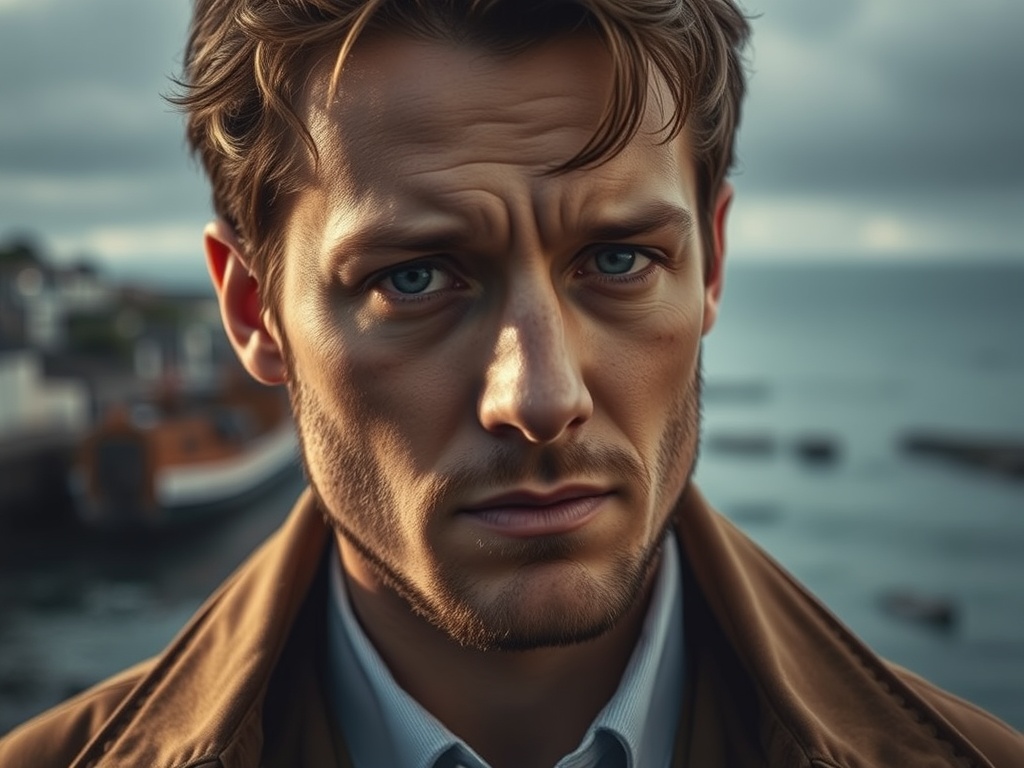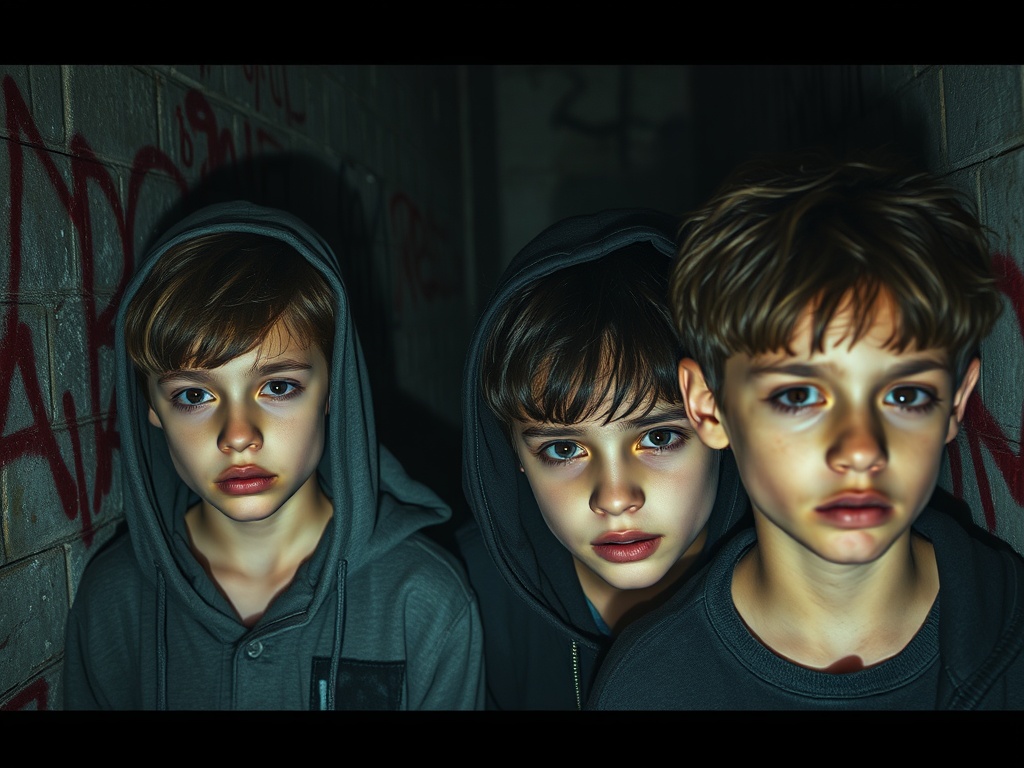Damien Molony: The Art of Performance and Reimagining Bergerac
Damien Molony sits across from me, punctuating his palm with increasing intensity. “You’ve got to nail the impact right – the sound, the give, you see?” he passionately explains. “You’re always sore, always nursing some kind of ache after filming a fight scene.” Interestingly, he reveals that it’s often more taxing to feign being on the receiving end of a punch than to deliver one. “Snapping your head back – hard and fast like this – can really take a toll,” he adds, mimicking an unseen blow that makes it feel as if I’ve struck him myself. “Before those scenes, you need to do a lot of warm-ups,” he grins, twisting his skull in every possible direction, gripping the sides of his face.
This enthusiasm for staged violence, which he previously showcased in his role as the ferocious vampire Hal in the BBC’s 2009 sci-fi series Being Human, contrasts sharply with Molony’s gentle demeanor and his creamy, Guinness-foam-soft Irish accent. Recently, he utilized this charm as the unfaithful Tyler in the immensely popular BBC drama The Split. However, audiences can expect to see him engage in some grueling on-screen brawls in his lead role in UKTV’s reboot of the classic 1980s detective show: Bergerac.
Amazingly, the 40-year-old Molony didn’t watch the original series, which starred John Nettles as the titular detective, until after he had been cast. He sheepishly admits, “The 80s crime show I grew up with was MacGyver – you know, the American guy with the blow dry and the Swiss army knives?” Nevertheless, the original Bergerac, which aired for nine series from 1981 to 1991, was a cultural touchstone.
Broadcast on Sunday evenings following Songs of Praise, the show attracted a staggering 15 million viewers who tuned in to watch Jim Bergerac confront the criminals plaguing the idyllic island of Jersey. The picturesque settings offered audiences a dual pleasure: a brief escape to the island’s stunning glass-fronted balconies and sandy shores, alongside a glimpse into the lavish lifestyles of the Channel Islands’ affluent tax exiles, epitomized by series regular (and Bergerac’s father-in-law) Charlie Hungerford.
Local hotel and restaurant owners credited the series with a 50% boost in tourism, while souvenir hunters eagerly snapped up memorabilia, including Bergerac-branded aftershave. While the original series was a straightforward whodunit, with Nettles’s character solving a new crime each week, the reboot presents a more complex and nuanced narrative in which Molony’s detective unravels the murder of a wealthy young mother over six episodes.
“I approached it more as a family drama,” explains the actor. “My Bergerac is grappling with the death of his wife. We meet him at a time when he’s been numbing that grief with alcohol and losing the trust of his daughter. They’re both struggling to cope with the central pillar of their family disappearing. Bergerac’s daughter wants to live with her grandmother” – played by Zoë Wanamaker in a gender-swapped role as Charlie Hungerford – “which forces him into AA, trying to rebuild his police career after taking a leave of absence.”
The new version is penned by Toby Whithouse (who also created Being Human), and Molony praises the clever ways in which the script subverts typical detective genre conventions. “Often, the detective hero makes mistakes along the way to solving the crime, but usually the rest of the cast and the audience are unaware of his errors. This time, Whithouse has crafted a brilliant scene where we all know Bergerac has blundered, and some of his fictional colleagues are laughing at him.”
Insights from a Rising Star

Ever the student, Molony sought to understand grief by reading neurosurgeon Paul Kalanithi’s poignant memoir, When Breath Becomes Air. To embody the role of a detective motivating his team, he watched videos of Irish rugby coaches in action. Nettles was invited back for a cameo but declined, asserting that “at 80, I’d just get in the way.” The cozy crime veteran, who later starred in Midsomer Murders, also expressed skepticism about whether a reboot would resonate, since “the show belonged to Thatcherite Britain, a time of fast money and beautiful women.”
Times have indeed changed. The new Bergerac eschews the original’s playful indulgence in charming rogues. The hero is no longer perpetually welcomed onto yachts by flirtatious married women sporting bubble perms. “But the leather jacket is still there,” Molony reassures. “And the car, which he sometimes sleeps in. Plus, faint echoes of the iconic original theme music weave into the soundtrack.”
Regularly clad in fitted trousers and a well-worn leather jacket, or behind the wheel of his gleaming maroon 1949 Triumph Roadster, the series turned Nettles into a sex symbol, who humorously remarked that prior to landing the role, he could “count my successes with women on one hand.”
The floppy-haired, soft-eyed Molony has a bit more experience as a heartthrob. Two female actor-scriptwriters have cast him as their romantic lead in their respective shows: Phoebe Waller-Bridge selected him to play her potential love interest in the 2016 sitcom Crashing, while Roisin Conaty featured him as her character’s will-they-won’t-they driving instructor in the comedy GameFace from 2017-2019. He also appeared as the hunky plumber Gabriel in the third season of Lisa McGee’s Derry Girls. When I bring up his heartthrob status, he appears momentarily embarrassed, wincing and then hiding his face behind both hands.
Despite his swoon-worthy roles and on-screen fights, Molony comes across as quite shy. Born in 1983 to a doctor and a solicitor-turned-travel guide, he hesitates when I ask about his childhood. Eventually, he shares, “I played a lot of football.” When I inquire about his position, he replies, “Right-back.”
However, his imagination thrived when he was off the field. He would explore the countryside in search of ghosts (armed with a stick for protection) before returning home to watch WWE on television. “I think that’s where I fell in love with the idea of performance,” he beams. “It was all about entertainment, that roar of the crowd.”
Interestingly, Molony did not engage in acting as a child. “I didn’t join drama groups. But in our teens, I made a horror film with friends in the woods. This was right after The Blair Witch Project came out. I became fascinated by the tricks you could play with a camera – how the monster only has to exist in the audience’s mind, which can be far more terrifying.”
Being sensible, Molony first pursued studies in business and politics at Trinity College Dublin before “spending a lot of money” on a drama course at London’s Drama Centre (whose alumni include Michael Fassbender and Tom Hardy). For his audition monologue, he selected a speech from Martin McDonagh’s black comedy, The Lieutenant of Inishmore, where his character, a member of the Irish National Liberation Army, tortures a Belfast drug dealer while fretting over his sick cat, Wee Thomas. “More violence then?” I tease. “Oh… yeah! But it’s very funny.”
“At drama school, being 24 is like being geriatric,” he says. “But that drove me to focus intently on learning every day.” His passion for research flourished. When cast as Hal in Being Human, he delved into the psychology of addiction, perceiving the vampire as “an addict” and studying alcoholism and drug dependency. “It helped humanize Hal’s struggle to fit into society while feeling like an outsider.”
Molony has successfully balanced a flourishing theatrical career alongside his screen endeavors. While filming Being Human, he also appeared on stage at the Royal Court opposite Meera Syal in Andrea Lustgarten’s critique of capitalism, If You Don’t Let Us Dream, We Won’t Let You Sleep. In 2014, he followed his role as a Victorian detective in the second series of Ripper Street with a stint alongside Sir Ian McKellen in Harold Pinter’s No Man’s Land.
During the early run, Molony recalls a memorable moment when McKellen invited him to his dressing room and asked, “What are you going to do differently tonight?” Initially puzzled, Molony listened as McKellen explained, “Tonight I’m going to pretend my character has lost his glasses somewhere on stage.” This subtle shift didn’t alter the play’s obvious direction, but it transformed how the audience perceived the performance. “It made it feel so much more alive, as we were all witnessing something new and spontaneous,” Molony reflects with wonder.
He shakes his head in amusement. “Now, I approach performances differently each time. If I do six takes of a scene in something like Bergerac, the director has six unique options to choose from.”
Though Molony and his family, which includes a wife, a son, and a daughter, reside in London, they spent the summer on the “beautiful” island of Jersey, which he emphasizes is as significant a character as ever in the show. “They enjoyed the beach every day. We took a boat trip to a tiny island where we swam for 20 minutes before the tide covered the beach, and we saw dolphins dancing around us. In the evenings, we’d stop by the farm shop, where a fridge was stocked with delicious home-cooked meals like curry and lasagna, and you just left money in an honesty box.”
When I ask if Molony feels any pressure to promote the tax haven, he acknowledges, “That’s true. But honestly, the scenery is so stunning I can’t understand why more films aren’t shot there.”
Bergerac premieres on Thursday, 27 February, at 9 PM on UKTV Drama




